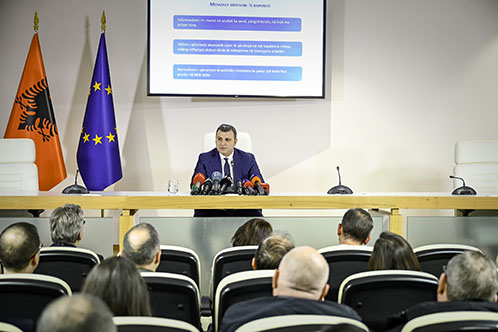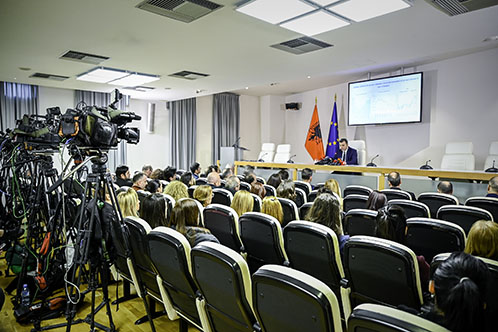BANK OF ALBANIA
PRESS RELEASE
Governor Sejko: Statement to the Press Conference on the Monetary Policy Decision, 7 February 2024
Publication date: 07.02.2024
Dear representatives of the media,
In today’s meeting, 7 February 2024, the Supervisory Council of the Bank of Albania reviewed and approved the Quarterly Monetary Policy Report.
The new information analysed in this Report has resulted in line with our expectations. The volume of economic activity continues standing on an upward trajectory, while inflation declined further in the fourth quarter of 2023. The normalisation of monetary policy stance has provided a positive contribution in this regard, through mitigating the domestic inflationary pressures and promoting the smooth functioning of money markets.

Projections for the future remain positive. Production, employment and wages will continue to grow in the medium-term horizon, while inflation is expected to gradually return to the target during the year.
The Supervisory Council deemed that the performance of monetary conditions will enable inflation coming bank to the target within the time horizon of several quarters. Against this backdrop, the Supervisory Council decided to maintain the monetary policy stance unchanged.
***
In 2023 Q4, inflation of consumer prices averaged 3.9%, slightly down compared with the previous quarter. The slower surge in prices of food items drove to the drop of inflation, while fuel and rent prices have been increasing and inflation of other basket items was relatively stable.

From the macroeconomic perspective, the decline of inflation in the fourth quarter reflected the reduced domestic inflationary pressures. This fall has reflected both the effect of the high comparative base of the previous year, as well as the consequences of the normalisation of the monetary policy stance so far. On the other hand, the external inflationary pressures have been increasing in the fourth quarter of 2023 - despite the exchange rate strengthening, due to the fast upsurge in prices of energy products across international markets.
However, the domestic inflationary pressures - though trending downwards - remain relatively high, yet not in line with our price stability objective. This performance is dictated by the relatively high demand for goods and services, which in turn keeps profit margins high, as well as by the fast rise in wages, which is further translated into increased production costs.

According to INSTAT data, the Albanian economy grew 3.5% in the third quarter of the previous year. Available data suggest that the economy will continue to grow at a similar pace even during the fourth quarter.
Unlike the previous quarters, the high external demand - and particularly - the rapid growth in tourism sector underpinned at a higher extent the economic growth. On the other hand, consumption and private investments continued to grow, but at slower rates compared with the previous quarters. Meanwhile, fiscal policy provided a neutral contribution in the economic growth. The expansion in the sectors of services and construction reflected the profile of the demand, while the activity in both sectors agriculture and industry inched down.
The expanded demand for goods and services has pushed the economy into a positive phase of the business cycle. This performance is reflected in: the continuous growth of employment; the minimum historical levels of unemployment rate; as well as the fast rise of wages in the private sector. The expansion of employment and wages has continued to support the growth of consumption in the economy, but - on the other hand - it also keeps internal pressures on inflation elevated.
Monetary policy has played a crucial role in controlling inflation and safeguarding the overall monetary and financial stability of Albania. The prudential normalisation of the monetary policy stance, achieved through gradual increases in the key interest rate, has enabled the smooth functioning of the domestic financial markets. This normalisation has been transmitted to an overall increase in interest rates of deposits and loans, establishing premises for a more balanced performance of the demand and supply of funds in the economy, but it has left the overall financial conditions in Albania in still stimulating positions.
In response to the supply simulating conditions and the high demand for financing, credit to private sector increased by 10% in 2023. This credit has: supported the expansion of consumption and the purchase of apartments by households; financed the expansion of investments by businesses; and met their needs for liquid assets. At the same time, the structure of the loan portfolio has improved during 2023, in the form of a significant increase in the share of loans in lek, and an improvement in its quality, in the form of a further decrease in non-performing loans ratio, at 4.7%. This ratio is the historical minimum recorded since the beginning of the global financial crises consequences, in 2008.
The update of forecasts suggests the positive economic trends will continue in the future as well.
The Albanian economy will continue to grow, boosted by the further expansion in consumption, investments and in the export of services. Liquid balances of the Albanian businesses and households, their confidence for the future, the fast growth of tourism revenues and the expansion of lending, in reflection of the positive approach of banks towards crediting, will feed the economic growth. However, the economic growth pace is expected to slow slightly in 2024 due to the still challenging external environment and return to its potential in the next years.
On the other hand, inflation is expected to continue reduce further over the course of the current year, and return to the target in its last quarter. This reduction will reflect a more balanced performance of the aggregate demand and supply in the domestic economy, and the further decline of inflation in our trading partners.
***
Judging on the above, the Supervisory Council decided to:
- Keep the base interest rate unchanged, at 3.25%;
- Keep the interest rate on overnight lending facility unchanged, at 4.25%;
- Keep the interest rate on overnight deposit facility unchanged, at 2.25%.
The Supervisory Council considers that the current stance of monetary policy is consistent with our expectations in the baseline scenario.
However, the Supervisory Council assesses that the elevated inflationary pressures from the domestic economy remain a risk factor for price stability in Albania, and the balance of risks to inflation remain to the upside. In this view, it highlights the willingness to continue the normalisation process of monetary policy stance, if this measure will be considered necessary for controlling and guaranteeing price stability. In any case, the next monetary policy decisions will be based on the new information, and consistent with fiscal policy stance and the exchange rate performance.

 Linkedin
Linkedin
 Twitter
Twitter
 Youtube
Youtube
 Facebook
Facebook
 Flickr
Flickr
 RSS
RSS
 Subscribe
Subscribe
 Feedback
Feedback